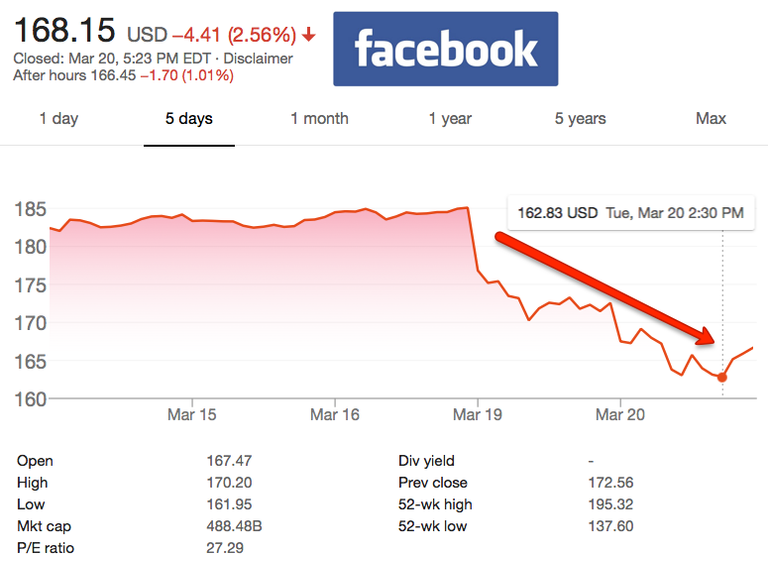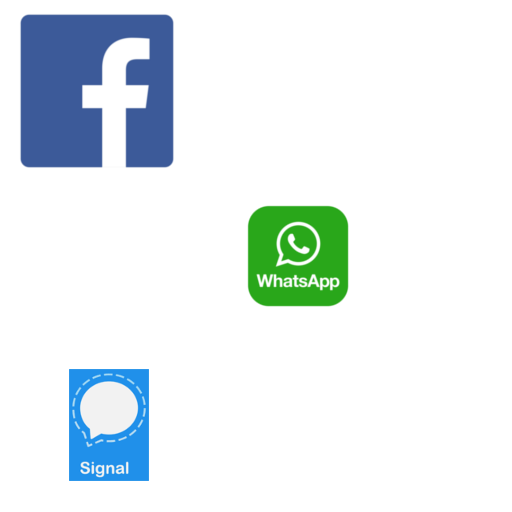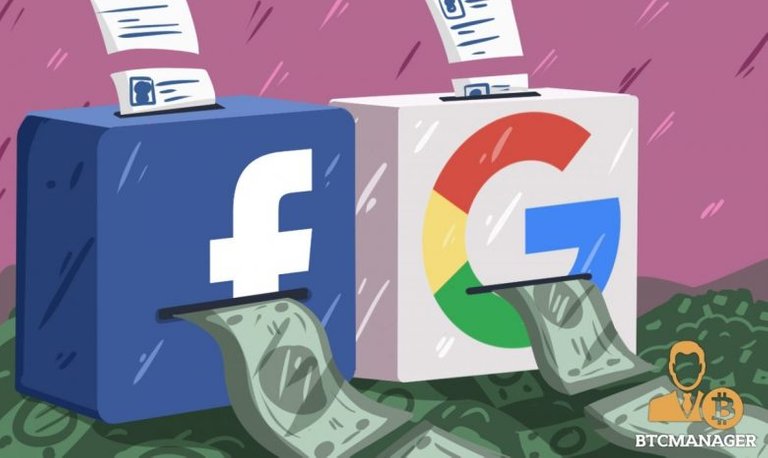
Cold hard facts:
- Facebook lost nearly $50 billion in market value this week and faced it's worst drop in four years
- This follows an article, published by The Guardian, on Cambridge Analytica, a data analytics firm that compiled information on 50 million Facebook profiles
- This information was used to influence the outcome of the 2016 Presidential Election, without the consent of Facebook
- Alexander Nix, CEO of Cambridge Analytica, has been suspended, after a Channel 4 news story uncovers shady tactics including bribery and entrapment
Cambridge Analytica: who are they and why are they important?
Cambridge Analytica spearheaded digital marketing operations (using tactics akin to Information Operations) for the 2016 Donald Trump campaign. Thanks to a convenient Facebook app that went viral called 'thisismydigitallife,' (built by Aleksandr Kogan, a Cambridge academic), Cambridge Analytica was able to get their hands on personal information that they morphed into data-backed psychological profiles of potential voters.
'thisismydigitallife' gave Kogan permission to access not only the user's information but also valuable information on all of their friends.
 |  |
|---|
While it is still unclear how wide Cambridge Analytica cast their net over the Donald Trump campaign, Alexander Nix and his colleagues don't hesitate in taking full credit for their work.
Cambridge Analytica's story is defined by shady business practices and high-level exploitive marketing for profits. Thanks to investigative reporting by The Guardian, a whistleblower named Christopher Wiley came forward to give us some deeper insight into their goals and tactics. If you'd like to learn more about that, I summarize it in a recent Steemit post.
That said, I don't want to focus on Cambridge Analytica. Despite my distaste for their work, there is a much deeper underlying problem here.
Remember Facebook's dipping stock price? Well, Facebook is now under a firestorm from the press and investors. In fact, some investors are suing Facebook in light of the Cambridge Analytica scandal. And the US Federal Trade Commission (FTC) is investigating Facebook's possible violation of a consent decree.

On social media (somewhat ironically), #DeleteFacebook is trending on twitter. However, this is more notable than you might think, since Brian Acton proudly tweeted it as well.
Who is Brian Acton?
Acton is the co-founder of WhatsApp. In case you weren't aware, Facebook acquired WhatsApp in 2014, and in Feb, 2018 Acton announced the creation of the Signal Foundation. Singal, developed by Open Whisper Systems (which should already give you a hint), is an encrypted social messaging app. It's super secure.
 Facebook acquires WhatsApp, so the WhatsApp co-founder creates the Signal Foundation...let that soak in for a moment
Facebook acquires WhatsApp, so the WhatsApp co-founder creates the Signal Foundation...let that soak in for a momentBrian Acton created the Signal Foundation starting with $50 million. To some extent, the Signal Foundation is the antithesis of Facebook; Signal's own staff couldn't read your messages even if they wanted to.
I highly encourage you to glance through Signal Foundation's Feb 21st announcement.
Here are some highlights:
Over the lifetime of the project, there have only been an average of 2.3 full-time software developers, and the entire Signal team has never been more than 7 people.
Signal has never taken VC funding or sought investment, because we felt that putting profit first would be incompatible with building a sustainable project that put users first.
We are launching the Signal Foundation, an emerging 501(c)(3) nonprofit created and made possible by Brian Acton, the co-founder of WhatsApp, to support, accelerate, and broaden Signal’s mission of making private communication accessible and ubiquitous.
As more and more of our lives happen online, data protection and privacy are critical. This isn’t just important for select people in select countries. It’s important for people from all walks of life in every part of the world. Everyone deserves to be protected.
Compared to Facebook, Signal is small. But, their work hasn't gone unnoticed; Microsoft and Google have both integrated Signal Protocols into their messaging platforms.
We're seeing small cultural shifts when it comes to data security.
Facebook has become a powerhouse built on selling personal information to advertisers. This has become a cautiously accepted norm — users know their information is unprotected on sites like Facebook but choose to use the service anyways, viewing it as an inevitable sacrifice.
We've become accustomed to our data not being our own.
If I proposed that Facebook pay every user for their information, it would seem absurd. I mean it's a tradeoff, right? I get to use the service provided at no cost, and in return, Facebook gets to use and access my personal information.
Though, Facebook offers a more lucrative service to marketers and political influencers (and I'm sure that's just the tip of the iceberg).
If you haven't already, although it is long and dry, you should consider reading (or at least glance at) Facebook's Data Use Policy.
Under 'How we use the information we receive,' Facebook writes:
"Granting us permission to use your information not only allows us to provide Facebook as it exists today, but it also allows us to provide you with innovative features and services we develop in the future that use the information we receive about you in new ways."
The language of that is cringeworthy. But don't worry, it's all in the name of innovation. You get to look forward to all the "new ways" Facebook has your back. Props to anyone who can make a funny meme about this.
Blockchain

This brings me to the final interwoven narrative of this piece, the Blockchain.
I'm going to assume you know what the Blockchain is (considering that this platform is built on one). If you need a refresher, you can read what I had to say about John Oliver and the Blockchain.
What you may or may not be aware of is Blockchain's power to store and protect personal data. More so, Blockchain's ability to grant full ownership of that data to the individual.
While fairly simple, that can genuinely be a hard concept to grasp. Full ownership. What does that even mean?
For one, Blockchain technology could keep your private & personal information decentralized; no one central server or entity could own or disseminate it as they wish.
There are all sorts of industry applications, including healthcare. Medical information could be kept secure, cut costs and lay in the hands of the individual. EncrypGen is an interesting case study alongside many other Blockchain based healthcare startups.
Kalpa Digital Health is tackling Electronic Medical Records, and back on the marketing front, companies like Kind Ads seek to cut out the middle-men, connecting marketers directly with consumers.
If any of this sounds too good to be true, don't take it directly from me.
Give Google news a whirl and see what you find. If you're interested in the technicalities, Decentralizing Privacy: Using Blockchain to Protect Personal Data is a good starter.
Like many new potential disrupters, time will tell how disruptive Blockchain technology will be on data & privacy. I am interested in hearing your thoughts. Where do you think we're headed in 2018 and beyond?
Thanks for the Upvote :)
I would never post my peeks at facebook 😊
Here they are appreciated... with fb just sold. So more inspiring for the guys here... 👍🏼
@peekbit
good choice... make us all happy here 😃👍🏼 Thank you...
An offer to everyone on demand... 😊
very nice. steemit is ready to take the spoil.
You got it man. We're seeing slow but massive cultural shifts
Congratulations @cryptospreads! You have completed some achievement on Steemit and have been rewarded with new badge(s) :
Click on any badge to view your own Board of Honor on SteemitBoard.
To support your work, I also upvoted your post!
For more information about SteemitBoard, click here
If you no longer want to receive notifications, reply to this comment with the word
STOPVERY SMART...MAN THANKS FOR THE HEADS UP
I'd like to see some sort of alternative copyright protection emerge from the blockchain. The cabal blatantly steals patents, copyrights, inventions, and royalties from anyone who applies for one. In their minds, since you are "applying" or "registering" with them, they assume that you are handing over ownership to them!
Isn't that great! And the best part about it is that they charge you to do it! Then they get to decide how viable your intellectual property is and which one of their cronies they're gonna sell your idea or invention to, leaving you pennies for your time, thoughts, and work. Look at what they did to Nicola Tesla, Royal Raymond Rife, and George Lakhovsky.
What a monopolized racket! Oh, wait, I was talking about the beast, wasn't I?